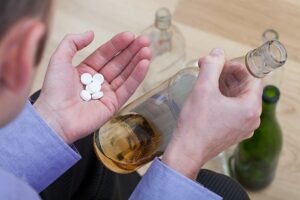
According to Greek mythology, Sisyphus, King of Corinth, tricked Zeus and cheated death more than once. This angered Zeus so much that he banished Sisyphus to the underworld where he had to push a boulder up a hill for all eternity. Every time he got to the top, the boulder would roll back down the hill and he’d have to start all over again. Managing symptoms of your mental health disorder can feel a lot like pushing a boulder up a hill, especially if your psychiatric medication isn’t providing relief.
While you might take your medication as prescribed, there may be days when you feel like your symptoms are too much to handle and you seek an additional solution. For some, that solution is alcohol use. Mixing alcohol with psychiatric medications can be dangerous for your health, but treatment centers like The Raleigh House can help.
Why Do People Mix Alcohol with Psychiatric Medication?
Mental health disorders like depression can make every day feel like a struggle. You may still experience symptoms like stress, anxiety, and feelings of hopelessness even with the support of psychiatric medications. The long-term effects of alcohol on the brain can also exacerbate these symptoms, making it even harder to manage your mental health effectively.
For example, antidepressants have the ability to elevate your mood by balancing serotonin levels. But your antidepressant medication might not be targeting the correct chemicals in your brain and doesn’t help your reaction to depression triggers.
In cases like this, alcohol is seen as a quick way to alleviate remaining symptoms. Alcohol is a sedative that relaxes your central nervous system, reducing feelings of depression and anxiety. However, this short-term benefit can lead to a wide variety of consequences, especially when alcohol use contributes to sedative addiction, particularly when mixed with your medication.
Alcohol Mixed with Different Types of Psychiatric Medication
Mixing Alcohol with Antidepressants
Antidepressants are used to treat anxiety and depression disorders. If you drink while taking antidepressants, your depression symptoms can actually worsen. You also run the risk of suffering the side effects of your medication.
Some of the most common side effects of mixing alcohol with antidepressants include:
- Drowsiness
- Nausea
- Increased risk of cardiovascular issues
- Spikes in blood pressure
- Your medication becoming less effective
If you’re taking antidepressants, abusing alcohol can be fatal. Even though alcohol might offer a brief escape, it’s not worth the risk to your health.
Mixing Alcohol with Bipolar Medication
Bipolar disorders and alcohol abuse often go hand-in-hand, which is why addiction treatment centers like The Raleigh House offer dual diagnosis treatment. Part of the purpose of bipolar medication is to bring balance to your mood. Drinking alcohol disrupts that balance and intensifies your depressive or manic states.
Mixing alcohol with bipolar medication can furthermore increase your risk of self-harm, as both can raise your likelihood of impulsive behaviors. In fact, research shows that people suffering from bipolar disorder who abuse alcohol have double the risk of suicide.
Mixing Alcohol with Benzodiazepines
Benzodiazepines are oftentimes prescribed to treat anxiety disorders. Since this is a depressant drug, it can lead to lethargy, drowsiness, memory impairment and depression. When mixed with alcohol, another depressant, both drugs can have dangerous effects on your central nervous system.
Mixed together, benzos and alcohol can lead to memory loss and mood swings, severe depression and nausea. Mixing these two substances can also cause organ failure and be life-threatening if left untreated.
Fortunately, there is hope for recovery if you’ve mixed alcohol with any of these psychiatric medications. The Raleigh House offers dual diagnosis treatment, which includes benzodiazepine addiction treatment, designed to address your substance abuse and help you find the most effective means of managing your mental health disorder. Understanding what it takes to get clean of all drugs and alcohol is a vital part of this process, ensuring that you receive comprehensive support throughout your recovery journey.
Find Healing from Alcohol Addiction and Mental Health Disorders Today
At The Raleigh House, we know how debilitating a mental health disorder can be – and how tempting it is to use alcohol as a way to cope. However, it’s important to understand why alcohol can make anxiety worse, as alcohol use often leads to increased anxiety symptoms over time. Our team has over 10 years of experience helping people recover from alcohol abuse and manage their mental health disorders just like yours. Through our mood disorders treatment, we provide the necessary support to address both addiction and underlying mental health challenges, helping you achieve long-term recovery and stability.
Through our gold standard continuum of care, you’ll have the opportunity to achieve long-lasting recovery and find new ways for managing your mental health symptoms. Contact our team today to learn more about how our dual diagnosis treatment can help.
Related Articles
How to Differentiate Signs of Addiction and Mental Health Disorders
Can Alcohol Abuse Cause Bipolar Disorder?
Who is Most Likely to Become an Alcoholic and Why?
Dual Diagnosis: Understanding Co-Occurring Disorders, Treatment Overview & More
